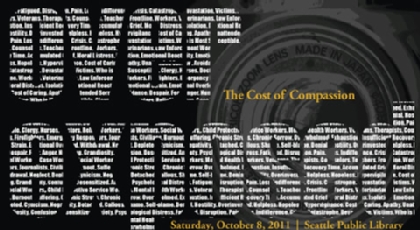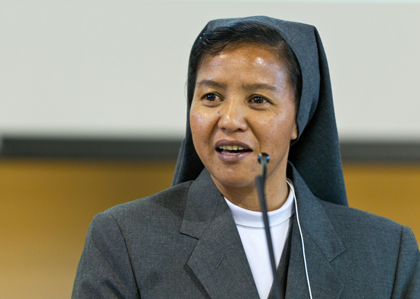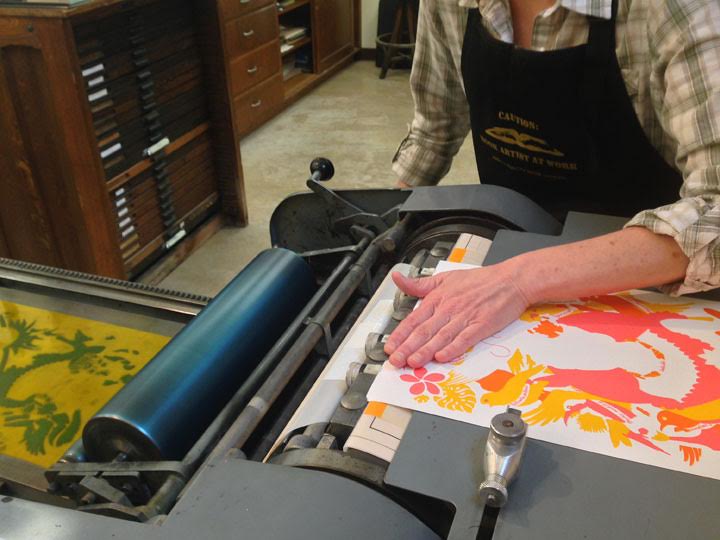Page 148 • (2,625 results in 0.027 seconds)
-

Fall 2019. Marissa Moultrie The second place winner, Gillian Dockins, mezzo soprano, a senior Music and English double major from Portland, Oregon, was awarded $500. Third place winner Brennan Brichoux, baritone, a Music major and Seattle native, was awarded $250. Congratulations to all those who participated in this inaugural competition! Read Previous PLU Wind Ensemble travels to Hawaii Read Next Snapshot of the recent Honolulu trip LATEST POSTS PLU’s Director of Jazz Studies, Cassio Vianna
-

been a busy year, but we’ve learned so much,” Scaff said. “Our goal now is to bring awareness to this issue, so people can identify it and know how to cope.” Rile and Scaff, both communication majors concentrating in journalism, as well as Herzfeldt-Kamprath, a English major and communication minor, are members of PLU’s MediaLab. Established in 2006, MediaLab provides students with opportunities to explore various methods of mass communication. “Overexposed” marks the seventh film produced by
-

in Meghalaya must carry water for their family and many seek work outside the home in the mines. Seventy percent of children drop out of school, many of them to go work in the mines. “Women are the ones who are suffering from the sanitation problem,” Puwein said. Women are the ones working in the mines and who “suffer most from water borne diseases such as anemia and malaria.” The community college, where Puwein teaches English is trying to address the high drop out rate, but they also need clean
-

Smith and Associate Professor of Biology Mary Ellard-Ivey``Protest``Guests: PLU President & Professor of English Thomas W. Krise and Assistant Vice President for Diversity, Justice & Sustainability Angie Hambrick Read Previous Musher turned author: Alumna harnesses her PLU education to recount experiences on Iditarod Trail Read Next PLU awarded total of nearly $590,000 in state grant money for intensive, alternative route for teacher certification COMMENTS*Note: All comments are moderated If the
-
homeland. Increasingly in today’s society, hospitality has come to be confined only to our known circles, our close friends, associates and near relatives. In these rancorous, sometimes suspicious times – and in a political climate in which people from opposite sides are not encouraged to work together or even agree on anything at all – the spirit of selfless service to strangers has almost become a lost art. Thomas W. Krise, Ph.D.President and Professor of English, Pacific Lutheran University Quite
-
/feminism (as opposed to art). “It’s unusual to have artists that also do their own writing, especially collaboratively, so folks are surprised to hear [that it’s historical in nature],” Spring says. “I enjoy a fairly active day printing, and just sitting for lengthy periods to write or research was tough. While the writing was difficult, I enjoyed focusing on the social issues we pair with the feminists in the book and especially connecting some threads throughout their histories.” Since Spring and
-

been catalogued as history/biography/feminism (as opposed to art). “It’s unusual to have artists that also do their own writing, especially collaboratively, so folks are surprised to hear [that it’s historical in nature],” Spring says. “I enjoy a fairly active day printing, and just sitting for lengthy periods to write or research was tough. While the writing was difficult, I enjoyed focusing on the social issues we pair with the feminists in the book and especially connecting some threads
-
came along and forced me to resign from my full and wonderful life. The diagnosis: metastatic breast cancer. The prognosis: lousy. In 2009, I went on sabbatical (I thought) to prepare to die. Instead I went into remission and wrote Hoping for More: Having Cancer, Talking Faith, and Accepting Grace (Cascade, 2012), a book that has altered the course of my writing and my scholarship. Since then I have spent much of my time speaking to groups about how to care for one another during the worst times of
-
instructor may ask to meet with the student in the presence of witnesses to resolve the matter. In this case, the student will be informed in writing of the purpose of the meeting, and of his or her right to have a witness present. When an instructor is unable to meet with a student, as at the end of Spring Term or a term before a student studies abroad, the instructor will document the allegation and send it to the student, via certified mail or email, together with a letter stating the penalty to be
-
writing on any subject in U.S. history, and Organization of American Historians’ Ellis W. Hawley prize for best book in post-Civil War U.S. political history. Dochuk has also co-edited a number of essay collections, including Sunbelt Rising: The Politics of Space, Place, and Region (University of Pennsylvania Press, 2011), American Evangelicalism: George Marsden and the State of American Religious History University of Notre Dame Press, 2014), and Faith in the New Millennium: The Future of Religion
Do you have any feedback for us? If so, feel free to use our Feedback Form.


